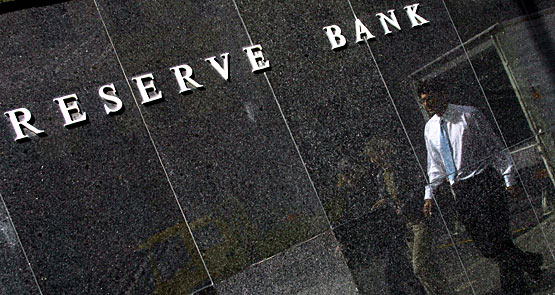No matter how much Treasurer Joe Hockey and Prime Minister Tony Abbott gild the budget lily next Tuesday night, the Reserve Bank believes the economy will run slower, and lower for longer than previously forecast, according to its second Statement of Monetary Policy for 2015, issued this morning.
The RBA has trimmed (for the second set of forecasts in a row) its growth forecasts and indicated it sees joblessness and subdued wage growth remaining with us for much longer than people had expected. And that is not encouraging news for the government, which is preparing to spend heavily on social welfare in the budget. Both relatively high unemployment and low wage growth remain major challenges to revenue projections in the budget, and constrain what can be done by government.
“GDP growth is forecast to remain below trend for a bit longer than had been anticipated in the February statement,” the RBA said. It’s not all bad news — the Bank sees a brighter outlook on employment. “The latest data from the labour force survey suggest that recent trends in the labour market have been a bit better than earlier indicated. Employment has grown by more than the working-age population over the past six months. This has been accompanied by a small increase in the participation rate, while the unemployment rate has been little changed at around 61⁄4 per cent. Accordingly, the starting point for the labour market forecasts is slightly more favourable than had been expected.”
Even so, that better news will be offset by slower growth. “Nonetheless,” said the Bank, “the fact that output growth is likely to take longer to pick up than earlier thought means that the unemployment rate will probably rise further to peak at 61⁄2 per cent in mid 2016 and remain elevated for longer.”
That will flow through to lower wages growth — a problem for Joe Hockey’s revenue. “A degree of spare capacity in the labour market and pressure on public and private sector employers to contain costs mean that wage growth is expected to remain subdued. It is not expected to slow further, but nor is it expected to increase much over the next couple of years.”
The RBA said economic growth was expected to be in the range of 2.5% to 3.5% in the year to June 2016, which was a quarter of a percentage point weaker than previously predicted. Growth for calendar 2015 has also been trimmed to 2.5% from a range of 2.25% to 3.25%.
So it was no wonder (and perhaps looking at the market overreaction to the post-meeting this week from RBA governor Glenn Stevens after the second rate of the year), that the RBA made it clear in this morning’s monetary policy statement that it was still looking at interest rates.
“The board will continue to assess the outlook and adjust policy as needed to foster sustainable growth in demand and inflation outcomes consistent with the inflation target over time,” the RBA said. This is obviously designed for the precious darlings in the markets who felt the removal of a similar line from Tuesday’s statement was bad communications. Certainly punters in the foreign change market did and chased the dollar above 80 US cents, and claimed the removal of such wording was the cause. Now the wording is back, so will the dollar return to 76 US cents or lower, in fear of another rate cut?
With even more tepid growth forecasts, then, all eyes now switch to Canberra to see how much assistance Joe Hockey will provide a struggling economy.









You cant cut your way out of demand-failure, and you can’t cut your way out of deflation making it worse. The Governments ideological commitment to a surplus – which either means taxes remaining unspent, or less expenditure so either way a reduction in private sector demand – is making it worse. But basically, the banks are tapped out. Even at 2% they will struggle to find anyone who can afford a mortgage and doesn’t already have one, where afford means have steady income for 30 years without default. You can spend your way out, of course, but its pointless if you give the money to the banks because, as the US has shown, they just take it as a windfall profit and give themselves bonus’ without actually lending it. So, basically, wait for the clamour to save the big four become the political catchcry of this crony Government and dont have any cash where they can find it.